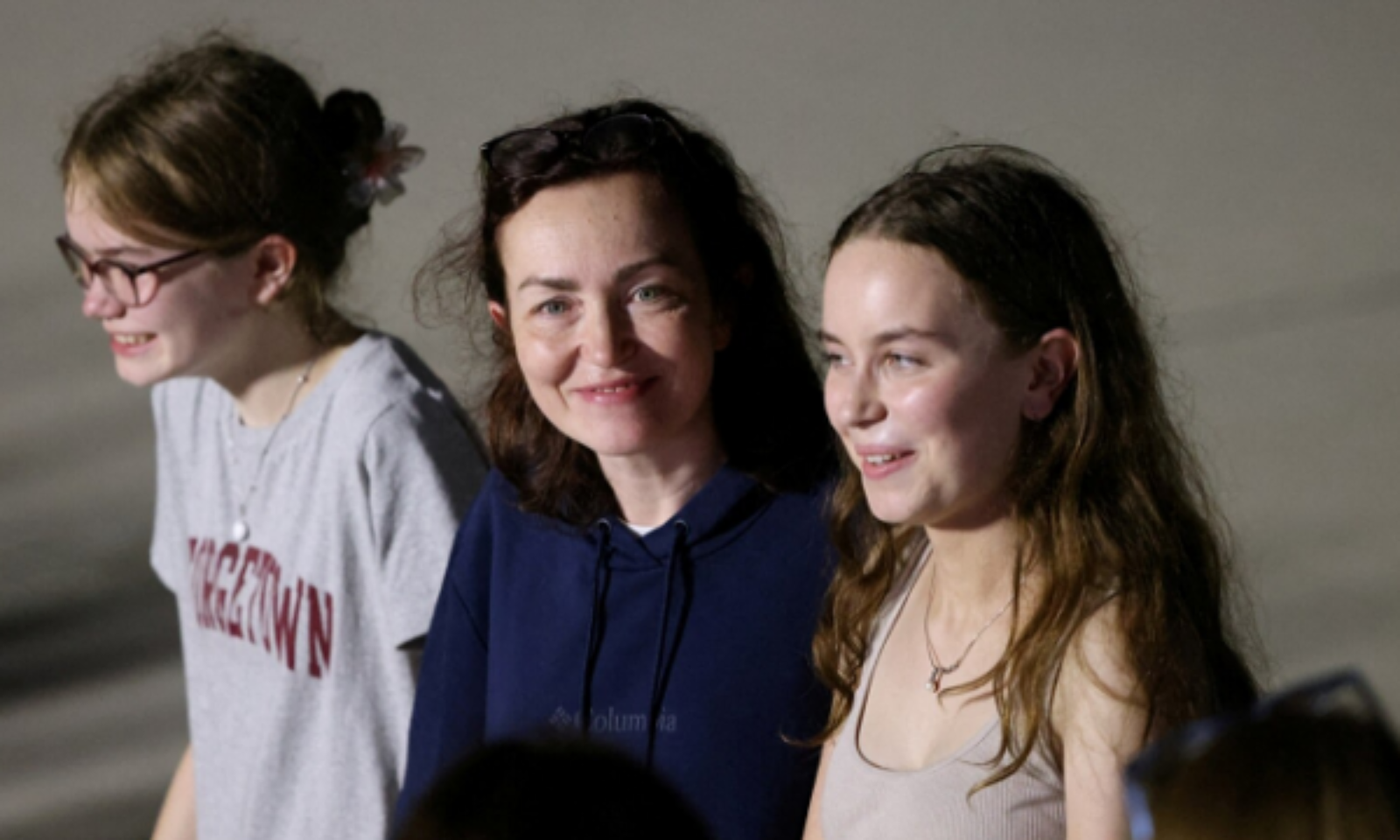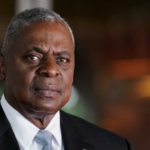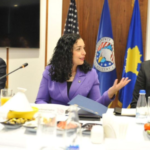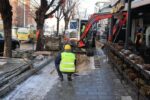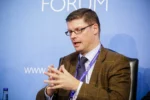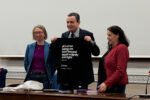Alsu Kurmasheva, a journalist for Radio Free Europe/Radio Liberty’s Tatar-Bashkir Service, was released from prison on August 1. She was part of a prisoner exchange between Western states, Russia, and Belarus. She spent 288 days in prison after the Supreme Court of Tatarstan found her guilty on July 19 of distributing “fake news” about the Russian military. Radio Free Europe/Radio Liberty provides a timeline of Alsu’s imprisonment and excerpts from the letters she wrote from detention.
In May of last year, Alsu Kurmasheva traveled to her hometown, Kazan, to visit her sick mother. At the beginning of June, she planned to return to Prague, where she lives, but at the airport in Kazan, security forces stopped her. They confiscated her two passports and phone. A few days later, a criminal case was initiated against her for failing to notify authorities of her dual citizenship. Alsu Kurmasheva holds both Russian and American citizenship.
The so-called investigation into the case dragged on for months. Only in October 2023 did a judge in Kazan find the journalist guilty and fined her 10,000 rubles. Alsu Kurmasheva was preparing to return home to her two daughters and husband.
However, a week after this verdict, the Radio Free Europe journalist was arrested. She was sent to the Investigative Committee, where she was informed that a criminal case had been initiated against her under Article 333.1 of the Russian Penal Code, concerning the failure to submit necessary documents to register as a “foreign agent,” an offense committed “by a person involved in gathering information in the military field or military-technical activities of the Russian Federation, receiving foreign funds, and this information could be used against the security of Russia.”
Kurmasheva was taken to a detention center for several days. On October 23, the Sovetski District Court of Kazan approved the investigators’ request and sent the journalist to a detention center.
Friends of the journalist received the first letter she wrote only a few days after her arrest.
“What’s inside me? Today I cried for the first time since… I don’t even know where this all began. I wasn’t expecting letters or packages, to be honest. But, everything came together, and I couldn’t hold back. Everything touched me. Especially the broom with a brush. Coffee with the confections – this is Tatar-style coffee,” Kurmasheva wrote.
In her first letter from detention, the journalist also mentioned that she was doing yoga, writing a lot, reading books, and thanked everyone who was helping her.
“Today, for a walk, they took us to a yard that was 4 by 6 meters. We ran 60 laps, so we approached running 1 kilometer. Then we did other exercises. The guard was very surprised. Apparently, this doesn’t happen often,” Alsu wrote in November 2023.
In subsequent letters, she frequently complained about the cold in her cell, where four people were housed.
“Everything you’re doing is very necessary and important. Even if you’re just drinking coffee or fixing a cupboard, do it now,” Kurmasheva wrote.
In December, Alsu’s husband, Pavel Butorin, told Voice of America that “Alsu knew the risks of her trip to Russia.”
“It wasn’t an easy decision,” Butorin recalled. “But Alsu is not only a mother who cares for her children, but she is also a devoted daughter. And she decided to go to Russia to help her mother. We knew there were risks, but we didn’t think she would end up behind bars. When she was stopped on June 2 while leaving the country, they immediately took her American passport. It became clear to us that this was all about her being an American citizen.”
Butorin then speculated that the delay in the investigation into the initial criminal case might have been because the authorities “were probably waiting for instructions from Moscow and were likely trying to build a more serious case” against her.
A few days after this interview was published, it was revealed that the Russian Investigative Committee had initiated another criminal case against Alsu Kurmasheva. This time, for spreading “fake news about the military.” She was accused of committing this offense after the publication of the book “No to War: 40 Stories of Russians Against Russian Occupation,” published in the fall of 2022.
“The book is a collection of stories from Russians who do not want their country to fight Ukraine,” said Pavel Butorin in mid-December. “I’m not a lawyer, but I found the Russian Constitution online: ‘Everyone is guaranteed freedom of thought and expression’; ‘Everyone has the right to receive, transmit, produce, and disseminate information freely by any legal means’; ‘Freedom of the press is guaranteed. Censorship is prohibited,’” he quoted the Russian Constitution, adding that even in Russia, citizens “have the right to speak. And journalists have the right to gather and publish these statements.”
Before the new case for “spreading fake news about the military” was initiated, Alsu wrote to her family that her cell, designed for four people, often had more inmates. She mentioned that it could happen that cellmates might be added in the middle of the night, even though there were only four beds.
“Hello. How are you? I’m fine, at least each of us has her own bed,” Alsu wrote at the end of November. “I’m happy that today I managed to sleep a bit. These are the internal matters of the cell, where love and compassion must be forgotten. God willing, all this will be temporary, and things will change very quickly – for the better.”
In December, Alsu wrote: “I can’t believe it’s been two months. Every minute causes wounds on me and on you.”
After three months in prison, Alsu wrote that “everything has changed.”
“I have changed, you have changed, and your letters have changed. After a long time, I received dozens of letters written during the holidays. They are so deep, as you shared your fear with me and forgot nothing,” Alsu wrote in a letter dated January 18.
She also mentioned in her letters that she regretted the trip she made to Kazan in May of last year.
“You admired my courage to come home ‘at such a time.’ But, we live now and there will not be another ‘time’ for us. The ‘time’ will continue, but maybe there won’t be someone nearby who needs help today. No one will give me back the three months of my life that I spent here, where I should not have been. I am responsible for my family. For my little daughters and my elderly mother. In my life and yours, there will never be a day like January 18, 2024. What did you do today? Whose door did we open? Because tomorrow will be tomorrow, and everything will be different. Today, on my table are postcards with photos of doors and windows opened. You are strong and will surely find answers to the questions you have. Open doors for yourself and for others. Don’t be afraid,” Alsu Kurmasheva wrote.
In one of her letters, she also mentioned that she had welcomed New Year’s Eve almost by sleeping the whole time.
“Thank you for the Christmas tree. The quality of the photo is good enough for my imagination. I see everything, especially I know how it looks and smells in the real world,” Alsu wrote, emphasizing that she had received “many beautiful letters sent to me, not just to one political prisoner.”
The journalist wrote that she had received many letters from Prague, Paris, Austria, Germany, and the USA. “It’s wonderful. It took a month for them to arrive.”
On January 13, Alsu Kurmasheva wrote that she had received some letters from her relatives. “More or less, the arrival of letters is being organized. I had a hard time without the letters. In fact, everything is slowly becoming more bearable. Where do I get my strength? I try not to spend it in vain.”
Pavel Butorin told reporters that their daughters had difficulty coping with their mother’s imprisonment.
“No one wants to grow up as the child of a political prisoner. This is a very difficult time for our family. But, I am grateful to their friends, their teachers. They are very busy with their studies and hobbies, both play guitar very well. And of course, this helps a little to cope with difficult situations. They have been without their mother for more than six months. Alsu has not heard her daughters’ voices for more than a month,” he said.
Butorin said he had talked to their daughters about the journalist’s imprisonment “every day.”
“Sometimes we talk more often than we should. Yes, at school they want to be like other students. But at home, the main topic of conversation is Alsu.”
From the early days of her imprisonment, Alsu’s friends subscribed her to several newspapers, most of which were in Tatar. In the spring of this year, Alsu wrote a letter to the editorial office of the newspaper “Beznen Gazit” (Our Newspaper).
“It has been ten months since I returned to Kazan to stay close to my elderly mother and sick brother. Half of these ten months I have spent at home with my relatives, helping them, without the right to leave. On October 18 of last year, I was imprisoned under charges that still make no sense to me,” Alsu Kurmasheva wrote.
She also mentioned that she “misses the Tatar language and conversations without fear.” Alsu wrote that “thousands of people around the world are fighting” for her release. “I want to have a quiet and peaceful life. I pray for this.”
My greatest desire is to leave here alive and in good health. Other desires I have forgotten. This part of my life will be a part of history,” said the journalist at the end of the letter.
On April 1, during a hearing regarding the extension of her pretrial detention, Kurmasheva made her first statement to the press. She said, “Some of my health problems have worsened” and added that “I do not feel well physically.” The journalist also mentioned that “the living conditions are poor. I do not have the means to take care of my health.” When asked by reporters if she was receiving medical assistance, Alsu replied, “minimally.”
” sooner or later I will come out of here, dressed in white clothes. I will drink tea, with special gratitude, knowing that such a thing is a priceless pleasure. But how will those who put me and my loved ones through such an ordeal feel? Will the judges who will read my sentence be able to lift their heads? Will those who separated me from my two children be able to live their lives?” Alsu Kurmasheva wrote in a letter to the newspaper “Beznen Gazit.”
Alsu’s husband, Pavel Butorin, made several attempts to draw attention to his wife’s case in the US. He, along with their two daughters, met with American congressmen, senators, officials, and public figures.
At the end of April, US President Joe Biden called on Vladimir Putin to release Kurmasheva as well as Wall Street Journal journalist Evan Gershkovich. “Journalism is not a crime,” he said.
A month later, on May 31, Alsu again spoke to reporters during a session for extending her pretrial detention. She showed drawings that some children had sent by mail.
“Parents send me their children’s drawings. I do not know these people. This drawing is by a three-year-old girl from St. Petersburg and this one by an American boy. Parents ask their children to draw freedom, joy, and these drawings are the result of those requests. Considering these will be the only trees and greenery I will see this summer, these drawings are precious to me,” she declared.
Alsu also told reporters that the authorities had transferred her to a cell with ten people, adding that she felt better.
On July 19, the Supreme Court of Tatarstan found Kurmasheva guilty of spreading false news about the military and sentenced her to six and a half years in prison. The trial was held through two sessions conducted behind closed doors.
On August 1, Alsu Kurmasheva was released. She was part of a major prisoner exchange between Western states, Russia, and Belarus. In total, 16 prisoners were released from Russia.
Following her release, the White House issued a statement from President Joe Biden. According to the statement, “The agreement reached for the release of Paul Whelan, Evan Gershkovich, Alsu Kurmasheva, and Vladimir Kara-Murza is a diplomatic triumph.”
“In total, we negotiated the release of 16 people from Russia, including five German citizens and seven Russian political prisoners in their own state. Some of these men and women had been wrongfully imprisoned for years. All of them had endured unimaginable suffering. Today, their agony has ended. I am grateful to our allies who supported us in these difficult and complex negotiations that led to this outcome, including Germany, Poland, Slovenia, Norway, and Turkey,” the statement read.
Shortly after, Biden addressed the White House. Pavel Butorin, along with daughters Bibisara and Miriam, were present at the event. Biden even sang Miriam a birthday song, as her birthday was the following day, August 2.
After the release, Pavel Butorin said they had hoped for months for Kurmasheva’s release.
“We had some indicators [for her release]. Then I saw the media reports. For a while, I stayed away from the internet because I didn’t want to read unconfirmed reports. But when I received the invitation from the White House, I realized that it was happening. And as I entered the White House, I saw the relatives of other Americans wrongfully imprisoned in Russia and understood exactly what was happening,” he said.
Butorin added that “everything seems like a dream,” and noted that they are very happy. He thanked the U.S. government and other states that assisted in the prisoner exchange process.
Steve Capus, president of Radio Free Europe, also thanked the U.S. government “and everyone who worked tirelessly to end Alsu’s unfair treatment.”
“Alsu was targeted simply for being an American journalist who was just taking care of her family in Russia. She did nothing wrong and certainly did not deserve this unfair treatment and violent separation from her family and colleagues,” said Capus.
Rim Gilfanov, the director of Tatar-Bashkir Service at RFE/RL, stated that throughout this time, colleagues had missed Alsu’s smile and presence.
“Alsu is a great professional and knows her job very well. She works with dedication. As a person, she always gives us all energy with her good disposition. We have missed this for a year. We hoped she would return as soon as possible, and it finally happened,” said Gilfanov.

